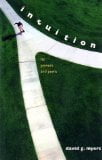 Intuition: Its Powers and Perils
Intuition: Its Powers and Perils
by David G. Myers
Yale University Press, £17.95 (hb), ISBN 0-300-09531-7
I had a good feeling about this book from the moment I read about it. Vast claims are routinely made for the powers of intuition, and those pleased by its results insist that it constitutes a mode of knowing equalling if not excelling that of science, with its tedious observations and bewildering calculations, and usually preferable. Hence an upto- date account of experiments showing the pitfalls of human judgment is more than welcome.
Of course, as Myers spells out, we’d be lost without intuition. Natural selection has favoured the quick-witted during all those millennia when articulation and numeracy were not available to us.
However, with the wisdom of hindsight, a faculty welldiagnosed in this book, I can now see a troubling pattern emerging. There seemed to be rather a lot of biblical quotations, and C. S. Lewis popped up a bit too often.
My conscious mind discounted these signs in the race for the final (13th) chapter on Psychic Intuition. There we find a decent summary of the failure of parapsychology to come up with any evidence for psychic claims after thousands of tests. Then, right at the end, comes a really disappointing straw-man argument that we should credit people who make a leap of faith, betting their lives “on a humble spirituality, on an alternative to purposeless scientism, gullible spiritualism, and dogmatic fundamentalism.” These are people who, according to psychologist Robert Emmons, “perceive a reality that transcends the material and physical”. They seem to include, for Myers, that vile obscurantist, Mother Teresa (exposed in Christopher Hitchens’ The Missionary Position, 1995).
If only the author had pondered the intuitionist sins of belief perseverance, availability and illusory correlation in respect of spiritual world-views, and made more of the counter-intuitive insights of Darwinism, we could have ended on a more constructive note.



